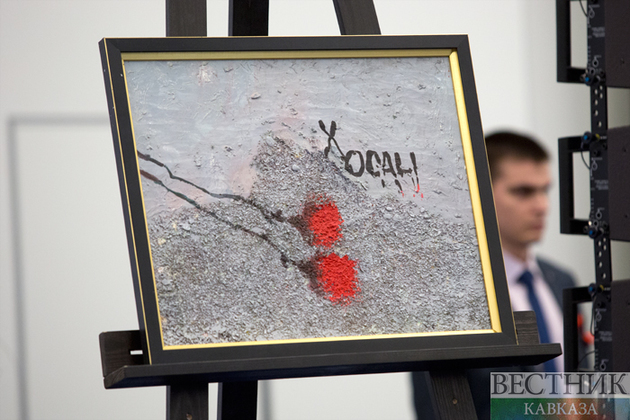On February 26, Azerbaijan will mark the 1992 Khojaly Massacre Day in memory of 613 innocent Azerbaijani men, women, and children who were slaughtered in one day for the crime of being Azerbaijani. This tragedy has been recognized as a form of genocide by Pakistan, Sudan, the Czech Republic, Bosnia and Herzegovina, Jordan, Mexico, Columbia, Guatemala, Honduras, Peru, and Panama, Jewish Press reports.
In honor of this important occasion, the Economic Peace Center is hosting a panel titled “Karabakh and the Khojaly Genocide” at the Menachem Begin Heritage Center in Jerusalem on February 28th at 7 PM, featuring former Minister Ayoob Kara, myself, prominent Middle East scholar Dr. Mordechai Kedar, Azerbaijani activist Lev Spivak and other speakers.
But Israelis may be wondering, how is the Khojaly massacre relevant for our times?
It is relevant because the crime of genocide has not yet been eliminated in our world, as the ongoing Chinese genocide against the Uighurs demonstrates. It started in 2017 and is still ongoing, yet the international community has chosen to ignore it and to allow China to host the Olympic Games in Beijing as if nothing wrong is happening.
It is relevant because elements of the French Jewish community have chosen to support the Armenian cause while remaining deafly silent about the Khojaly massacre of the 1990s. Much of the rest of the world has chosen to back Armenia merely because they are Christian, while completely ignoring what happened during the Khojaly Genocide.
Rabbi Israel Barouk wrote in “Khojaly: A Crime against Humanity,” that “of those who perished, 56 people were killed with particular cruelty: burning alive, scalping, beheading, gouging out of the eyes and the bayoneting of pregnant women in the abdomen.” An additional 1,275 people were taken hostage. Many of those who were held hostage were raped and tortured most viciously.
Elie Wiesel, the author of the “Night” trilogy, said, “When human lives are endangered when human dignity is in jeopardy, national borders and sensitivities become irrelevant. Wherever men or women are persecuted because of their race, religion, or political views, that place must at that moment become the center of the universe.”
As an Israeli American journalist, I was raised to believe that it is important to take a stance against all genocides and crimes against humanity. For today, it may be innocent Azerbaijani civilians, tomorrow it could be another nation and then the following day, it could be my people.
For this reason, I have dedicated my professional life to speaking out against terrorism, war crimes, and crimes against humanity like the massacre in Khojaly. I believe that since God gave us the privilege of living in a free democratic society, we have a moral duty to speak out in favor of those who are less fortunate than us, to be a voice for the voiceless underdogs, whose narratives have been silenced in a cruel world that has lost its moral compass.
Like the Jewish people, Azerbaijan’s history is also laden with tragedy. Azerbaijan was originally a democratic country, the first of its kind in the Muslim world who not only granted minorities equality but also gave women the right to vote in 1919, a good year before the United States did likewise. However, in 1920, Azerbaijan was invaded by the communists and became part of the Soviet Union. For decades, the people of Azerbaijan were repressed, which culminated in the Black January massacre of 1990.
And when the Azerbaijani people tried to break free, they found themselves in open conflict with Armenia, which resulted in the Khojaly massacre and with one-fifth of Azerbaijan being ethnically cleansed of Azerbaijanis. Only recently, the Azerbaijani people were able to reclaim their lands, yet they constantly receive condemnations from the Biden administration and other Democrats in the US Congress, just like Israel has. However, like Israelis, Azerbaijani’s dream of a better tomorrow.
The State of Israel has always stood by Azerbaijan, as it is one of its few allies in the Muslim world. As survivors of the world’s greatest genocide, we have a moral obligation to stand by the victims of the Khojaly massacre against a world that would rather stand by the perpetrators. Indeed, the international community must stop making excuses for Armenia if they want the peace to last in the Caucasus.
Former President of Israel Reuven Rivlin stated at the UN General Assembly in 2015, “On this day we must ask ourselves honestly, is our struggle, the struggle of this Assembly, against genocide, effective enough? Was it effective enough in Bosnia? Was it effective in preventing the killing in Khojaly? Of Afghans by the Taliban? Is it effective enough today in Syria? Or in the face of the atrocities of Boko Haram in Nigeria? Are we shedding too many tears, and taking too little action?”
He concluded, “I am afraid that the United Nations “Convention on the Prevention and Punishment of the Crime of Genocide” has remained a merely symbolic document. It has not succeeded in realizing its commitment and fulfilling the objective that underpins the establishment of the United Nations Organization. Therefore, this institution, where we are standing today, has a duty of unparalleled challenge not to make do with statements but rather to push ahead with decisive action.”
Had the international community heeded his advice, the world would have been a better place today for Azerbaijanis, Israelis, and everyone else.






